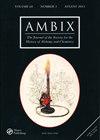近代早期欧洲的魔法、科学和宗教
IF 0.6
3区 哲学
Q3 HISTORY & PHILOSOPHY OF SCIENCE
引用次数: 0
摘要
钻研自然哲学的女人。芬德伦还探讨了埃尔库利亚尼决定在克拉科夫出版她的书,讨论了帕多瓦和波兰之间的知识联系,并暗示埃尔库利亚尼可能是在试图避免与宗教裁判所发生冲突(如果是这样的话,没有成功)。《自然哲学书信》为讲英语的读者提供了早期现代女性医学科学作品的一个令人兴奋的补充。汉娜·马库斯的翻译技巧娴熟,可读性强,使英语读者能够理解晦涩的意大利语和拉丁语文本,这本书应该适合各个层次的大学生。虽然介绍材料正确地将埃古利亚尼置于她的意大利背景中,但她的案例也引发了更广泛的关于早期现代欧洲性别和女性作者的问题。例如,奥莉瓦·萨布科(Oliva Sabuco)的故事有很多相似之处,她是一位西班牙医生的女儿,1587年以她的名义出版了两本关于医学的哲学著作,她也遇到了宗教裁判所的麻烦。这种融合提出了一些复杂的问题:在近代早期的欧洲,女性渴望做出智力贡献,而宗教当局却有能力让她们噤声。《自然哲学文论》在16世纪的命运很难令人振奋。在宗教裁判所的调查下,埃古利亚尼被迫为她的书辩护,反对异端的怀疑。虽然她似乎没有受到正式指控,但她也没有再发表任何文章。她的书从未被列入天主教会的“被谴责书籍索引”,但正如卡兰西指出的那样,这可能是因为她的书被认为没有足够的影响力来构成威胁。尽管如此,埃尔库利亚尼感到有权出版她的书信,这一事实表明,文艺复兴末期,受过教育的意大利女性充满了巨大的活力。紧随其后的女作家,如Moderata Fonte和Lucrezia Manella,更成功地呼应了她对女性智力的看法。尽管埃尔库利亚尼的书无法产生更广泛的影响,但她的作品值得被人所知,卡林奇、芬德伦和马库斯的共同努力,将她的故事以宏伟的细节呈现给了现代英语读者。本文章由计算机程序翻译,如有差异,请以英文原文为准。
Magic, Science, and Religion in Early Modern Europe
women who dipped into natural philosophy. Findlen also probes Erculiani’s decision to publish her book in Krakow, discussing the intellectual connections between Padua and Poland and suggesting that Erculiani might have been trying to avoid running afoul of the Inquisition (unsuccessfully, if so). Letters on Natural Philosophy provides an exciting addition to early modern women’s medico-scientific works available to an English-speaking audience. Hannah Marcus’s skilful and highly readable translations make the difficult Italian and Latin texts accessible to English readers, and the book should be suitable for university students of all levels. While the introductory materials rightly situate Erculiani in her Italian context, her case also provokes questions about gender and female authorship in early modern Europe more broadly. For example, there are many parallels with the story of Oliva Sabuco, the daughter of a Spanish physician under whose name two philosophical works on medicine appeared in 1587 and who also ran into trouble with the Inquisition. This confluence raises complex questions about women’s eagerness to make an intellectual contribution in early modern Europe and the power of religious authorities to silence them. The sixteenth-century fate of Letters on Natural Philosophy is hardly uplifting. Investigated by the Inquisition, Erculiani was forced to defend her book against suspicions of heresy. Although she does not appear to have been formally charged, she also did not publish again. Her book was never placed on the Catholic Church’s Index of Condemned Books, but, as Caranci points out, this was likely because it was not viewed as influential enough to pose a threat. Nevertheless, the fact that Erculiani felt empowered to publish her Letters demonstrates the great energy among educated Italian women at the end of the Renaissance. Women writers who followed Erculiani, such as Moderata Fonte and Lucrezia Manella, echoed her views on women’s intellect with more success. Although Erculiani was prevented from making a broader impact with her book, her work deserves to be known, and the combined efforts of Carinci, Findlen, and Marcus bring her story to modern English readers in magnificent detail.
求助全文
通过发布文献求助,成功后即可免费获取论文全文。
去求助
来源期刊

Ambix
HISTORY & PHILOSOPHY OF SCIENCE-
CiteScore
0.80
自引率
60.00%
发文量
42
审稿时长
3 months
期刊介绍:
Ambix is an internationally recognised, peer-reviewed quarterly journal devoted to publishing high-quality, original research and book reviews in the intellectual, social and cultural history of alchemy and chemistry. It publishes studies, discussions, and primary sources relevant to the historical experience of all areas related to alchemy and chemistry covering all periods (ancient to modern) and geographical regions. Ambix publishes individual papers, focused thematic sections and larger special issues (either single or double and usually guest-edited). Topics covered by Ambix include, but are not limited to, interactions between alchemy and chemistry and other disciplines; chemical medicine and pharmacy; molecular sciences; practices allied to material, instrumental, institutional and visual cultures; environmental chemistry; the chemical industry; the appearance of alchemy and chemistry within popular culture; biographical and historiographical studies; and the study of issues related to gender, race, and colonial experience within the context of chemistry.
 求助内容:
求助内容: 应助结果提醒方式:
应助结果提醒方式:


